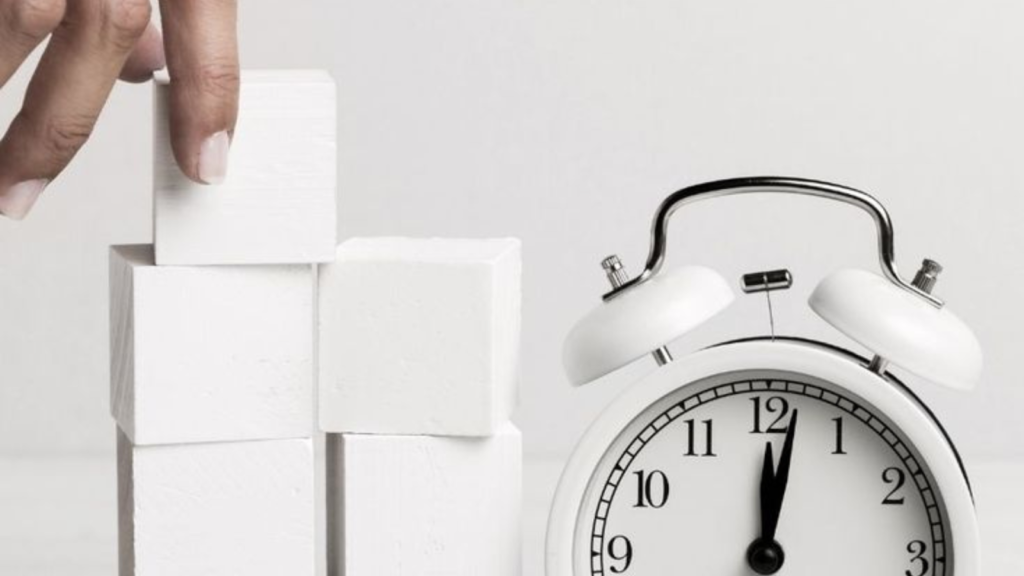A typical year is made up of 8,760 hours, but a leap year has 8,784 hours—a twenty-four hour extra time. So, the question here is how can you ensure that you make the most of your spare time?
Source: Pinterest
We have put together some practical tips for you to help you have the most productive year ever. Now let’s explore them together.
Track your Time
As you go about your life, you can quickly lose track of time, leaving you with no recollection of half-hour gaps. To get a clear picture of how you spend your day, track your activities from 5 am to 4:30 pm for a week.

Source: Pinterest
You can utilize tools like Outlook, a time-tracking sheet, or a spreadsheet with days across the top and half-hour blocks on the side. You can also check in every few hours to keep track of your activities and improve your time management.
Ask yourself what you’d Like to Spend More Time Doing
After tracking your time, you can celebrate the things you’re doing right in your weekly routine and stop blaming yourself for wasting time. Then ask yourself what you’d like to spend more time doing.
Source: Pinterest
The more time you dedicate to engaging in activities that bring you joy, the less time you will have for pointless activities like endlessly checking emails or reading through social media.
Schedule your Week Ahead of Time
To boost your productivity, you need to create a realistic plan prioritizing your favorite activities. You can do this on Friday afternoons, when you’re not in the mood to start new tasks but are still open to planning and scheduling the upcoming week.
Source: Pinterest
This ultimately results in your time being productive instead of wasted. Unlike Sunday nights, planning on Friday lets you set up meetings and contact people during work hours while also considering your weekend plans.
Create Your Bedtime
People usually don’t get enough sleep, which leads to a cycle where they stay up late and wake up tired. You can break the cycle by figuring out your wake-up time and counting back seven hours (or however much sleep you need) to set your bedtime.
Source: Pinterest
Maintaining regular sleep schedules will help you prevent falling asleep at your desk during your working hours. Also, having a consistent sleep routine can significantly impact your overall well-being and productivity.
Time Blocking
It’s amazing how time blocking works. It involves devoting particular time slots to different tasks or groups of related duties. For instance, you can concentrate on deep tasks, like writing or strategic planning, from 9 to 11 AM.
Source: Pinterest
You can also take care of emails and administrative work between 1-2 PM. You see, assigning each activity a specific amount of time can help prevent multitasking and improve your focus and productivity.
Set Boundaries and Learn to Say No
Overcommitting is one of the main factors that reduces productivity. It is important that you set limits and know when to say no. It only means saving your time and energy for the things that are really necessary.
Source: Pinterest
This does not mean that you have to be unhelpful or disagreeable; rather, it implies that when a task doesn’t fit your priorities, you can politely decline or assign it to someone else.
Automate and Delegate
You don’t need to handle every task on your own. It’s important that you determine which tasks can be assigned or automated, and that you use solutions like Zapier to automate routine tasks.
Source: Pinterest
Additionally, you may need to consider employing a virtual assistant; you will need all the help you can get. So it can enable you to free up your time from repetitive or low-impact tasks, which can help you focus on high-impact work.
Take Care of your Health
There is a strong connection between your physical health and your mental well-being. You need to make sure you’re getting enough rest, maintaining a good diet, and working out regularly.
Source: Pinterest
Throughout the day, take breaks to stretch and move around. Remember to stay hydrated and practice mindfulness or relaxation to take care of your mental health.
Limit Distractions
You need to identify what is causing most of your distractions and create strategies to reduce or remove them. This might involve putting on noise-canceling headphones, shutting off alerts, or organizing a quiet workstation.
Source: Pinterest
Additionally, creating a “do not disturb” period during which you concentrate only on your most important responsibilities can be helpful at times.
Stay Organized
A well-structured to-do list and an orderly workspace can make a huge difference in your productivity. You need to keep your physical and digital spaces organized and make sure you can easily access the tools and information you need.
Source: Pinterest
This helps you stay focused on your work and cuts down on the amount of time you spend looking for things.
Keep Learning and Adapting
Since the world is ever-changing, so should your productivity strategies. You have to maintain curiosity and be open to new methods and tools. Seek out new information frequently, and be prepared to adapt your strategy when necessary.
Source: Pinterest
Constant improvement is the secret to long-term productivity. This allows you to produce exceptional work and achieve significant progress toward the goals you have set.